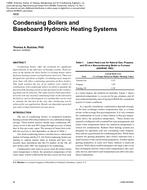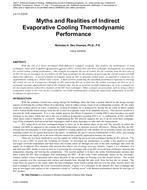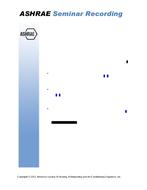This paper compares in situ measurements of R-values (Re) with R-values obtained from handbook calculations for 19 Army buildings in Colorado, Washington, and Alaska. The R-values were measured with heat flux and temperature sensors, with data, averaged and recorded for several days. The handbook calculations rely on borings in the construction, depth probes, boroscope inspection, and as-built drawings. A subjective measure of certainty about the construction reflects the quality of this information.
The differences between Re and R-value — ?R, normalized to R-value — were normally distributed about ?R = 0. This indicates that the measurement technique is unbiased, on the whole . The standard deviation of ?R was smaller for frame building walls than for the masonry and brick veneer walls. This reflects a better level of information about the frame construction.
Examination of selected study cases indicated that convection is a frequent heat, transfer mechanism in fibrous insulation, in both walls and attics. Thermal bridges were also evident from the measurements. Air leakage and moisture were not significant causes of ?R.
Measurements of R-value were found to be in good agreement with handbook values, where knowledge of the construction is good and where convection and thermal bridges are not major effects.
Units: Dual
Citation: Symposium, ASHRAE Transactions, 1985, vol. 91, pt. 2B, Honolulu, HI
Product Details
- Published:
- 1985
- Number of Pages:
- 10
- File Size:
- 1 file , 2 MB
- Product Code(s):
- D-HI-85-01-4


